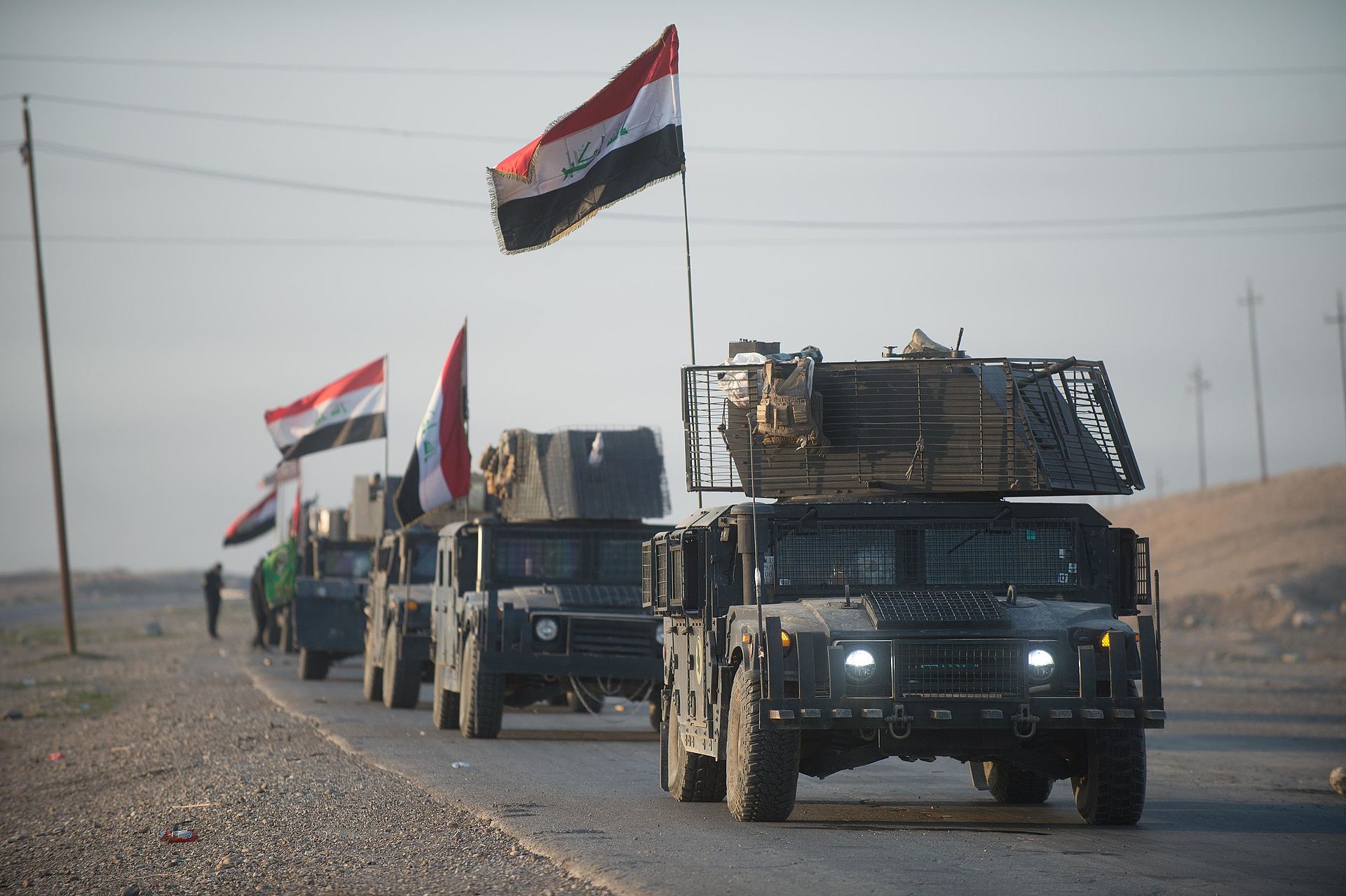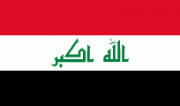
An Iraqi Counter-terrorism Service convoy moves towards Mosul, Iraq, February 23, 2017 (Source: US Department of Defense, Staff Sgt. Alex Manne/Wikimedia Commons)

IRAQ
 Our Concerns
Our Concerns
- Widespread practice of enforced disappearances by state agents and militias affiliated with the Popular Mobilisation Units;
- Systematic use of torture and the use of forced confessions in unfair trials before the Central Criminal Court of Iraq;
- Abusive use of the flawed Anti-Terrorism Law leading to the mandatory imposition of the death sentence.
On December 9, Iraqi Prime Minister Haidar Al Abadi declared military victory over the Islamic State (IS), which had gained control of large sections of Iraq during its 2014 offensive. According to the UN Refugee Agency, there are still 3.2 million people who have been internally displaced as a result of the fighting between IS and the central government forces or affiliated militias of the Popular Mobilisation Units (PMU).
In July 2017, after nine months of intense fighting, Iraqi security forces and affiliated militias retook Mosul. Over the course of the operation, the city was destroyed, thousands of civilians were killed or injured, and 920,000 people – about half of the city’s population – were forced to flee their homes.
Despite the fact that IS has lost most of the territory it gained, the security situation remains precarious in the country. On September 15, IS claimed responsibility for an attack that targeted a checkpoint and restaurants near Nasiriyah, killing more than 80 people.
In the field of justice and reconciliation, the Office of the UN High Commissioner for Human Rights (OHCHR) and the UN Assistance Mission in Iraq (UNAMI) supported efforts to initiate a legal framework to establish a specialised court which would be competent to try alleged perpetrators of international crimes committed since 2014. However, it is not clear whether the court’s jurisdiction will cover crimes committed by government forces as well as affiliated militias.
On August 21, the Iraqi Council of Representatives amended the General Amnesty Law No. 27, which provided for people convicted between 2003 and 2016 to be eligible to apply for amnesty, excluding those convicted of certain types of crimes, among which were acts of terrorism that resulted in death or permanent disability. Also excluded are acts committed after June 10, 2014, the date Mosul was captured by IS. These amendments also provided the right of judicial review to those convicted under the Anti-Terrorism Law.
At the federal level, tensions between the Kurdistan Regional Government and the Federal Government resurfaced in 2017 following a referendum on Kurdish independence on September 25, in which more than 92% voted in favour of independence. However, on November 21, the Federal Supreme Court deemed the ballot unconstitutional. Although the head of Iraq’s autonomous Kurdistan Regional Government criticised the ruling as “unilateral”, he said he would not challenge the decision. In this context, fighting erupted when Iraqi armed forces moved into the oil-rich city of Kirkuk, which had been under Kurdish control since 2014.

Abuses committed in the context of counter-terrorism
In 2017, numerous reports of summary killings, enforced disappearances, and torture committed during military operations have emerged. In particular, civilians fleeing combat zones have been exposed to revenge attacks from the Iraqi security forces and affiliated militias.
In November, the UN Special Rapporteur on extrajudicial, summary or arbitrary executions, Agnes Callamard, carried out an official country visit. During her visit, she was informed about a number of arbitrary killings and enforced disappearances committed by the security forces, including the PMU. These include not only the killings of fighters under suspicious circumstances, but also the killings and disappearances of civilians. Callamard also raised the issue of the disproportionate and indiscriminate bombing campaign conducted by coalition forces, which resulted in the deaths of hundreds of civilians.
Furthermore, the Iraqi authorities have continued to resort extensively to the flawed Anti-Terrorism Law of 2005, which contains a broad definition of terrorism and mandatorily applies the death penalty to those convicted of committing – or threatening to commit – such acts. As a result, most executions are carried out based on this legislation, and death sentences are rountinely handed down by the Central Criminal Court of Iraq (CCCI) following unfair trials.
When, on September 25, 42 people were executed on “terrorism” charges, the UN High Commissioner for Human Rights declared that he was “extremely doubtful” that the strict due process rules and fair trial guarantees, such as the defendants’ rights to legal assistance or a full appeals process, had been met in every case.
“The Iraqi authorities have continued to resort extensively to the flawed Anti-Terrorism Law of 2005, which contains a broad definition of terrorism and mandatorily applies the death penalty to those convicted of committing – or threatening to commit – such acts.”
Such arbitrariness is illustrated by the case of Salih Al Dualimi, a 47-year-old professor of engineering at the University of Anbar, who was sentenced to death in May 2016 by the CCCI for “belonging to an armed terrorist organisation” following a flawed trial. The only pieces of evidence used against him were self-incriminating documents he was forced to sign under torture as well as on “secret evidence” allegedly provided by U.S. intelligence. On April 27, 2017, the UN Working Group on Arbitrary Detention (WGAD) ruled that his detention was arbitrary and requested that the Iraqi authorities immediately release him. However, the Iraqi authorities have not implemented the decision and he remains detained to date.

The widespread and systematic practice of enforced disappearance
B etween 2014 and 2017, Alkarama, together with its local partner Al Wissam Humanitarian Assembly, submitted more than a hundred recent cases of enforced disappearances to the UN Committee on Enforced Disappearances (CED), all of which have yet to be clarified by the authorities. However, these cases are only the tip of a much larger iceberg in a country where the practice of enforced disappearance is widespread and systematic, and the rate of missing people remains the highest worldwide. This phenomenon began at the time of Saddam Hussein, persisted following the 2003 U.S. invasion, and escalated in the context of the fight against IS.
Enforced disappearances follow the same pattern: victims are commonly arrested by the security forces during house raids or at checkpoints before being taken to secret places of detention and denied access to the outside world. Their relatives are systematically denied any information as to their fate and whereabouts by the authorities. One such example is the case of Jalal Al Shahmani, a well-known organiser of the protests against corruption that were taking place in Baghdad in the summer 2015, who was arrested by militiamen and subsequently disappeared in September 2015. According to eyewitness, members of a militia group belonging to the PMU carried out the arrest. His relatives have since been left without any official information about his fate and whereabouts.
In addition to enforced disappearances carried out by the Iraqi security services, many individuals are still missing following their abductions by U.S. forces after the 2003 invasion. For example, in October 2017, Alkarama and Al Wissam also submitted to the UN Working Group on Enforced or Involuntary Disappearances (WGEID) the case of a taxi driver who disappeared in 2008 after being arrested by U.S. forces. His case adds to the four other cases of enforced disappearances perpetrated by American forces, which were registered by the WGEID in 2017. These cases are the first to ever have been submitted to this UN protection mechanism; the U.S. authorities have yet to provide information on the victims’ fate and whereabouts.

Freedom of expression and peaceful assembly under threat
On May 13, following popular protests, the Iraqi Parliament decided to indefinitely postpone its vote on the flawed Draft Law on Freedom of Expression and Peaceful Demonstrations. Presented to the Parliament in July 2016, the text was strongly criticised by civil society organisations, which proposed a list of amendments to address its shortcomings. Although the parliamentary committees took some of the NGOs’ concerns into account, the draft law still contains a number of problematic provisions. For example, protests can be banned if they are deemed to constitute a “threat to national security or public order and public morals”. Such a provision could be invoked by the authorities to stifle criticism of the government and its policies.
Meanwhile, journalists and media figures have continued to suffer from severe interference in the exercise of their profession, infringing their right to freedom of opinion and expression. On October 22, Samir Al Daami, an Iraqi-Norwegian political commentator, was arrested after publishing a post on Facebook criticising Iraq’s prime minister, Haider al-Abadi. In his post, Al Daami claimed that Al Abadi had used the country’s armed forces to retake Kirkuk so that the foreign oil companies that helped him become prime minister could gain control of the oil fields in Kirkuk. Al Daami was brought before the Public Prosecutor of the CCCI in Baghdad, where he was charged with “broadcasting false or biased information, statements or rumours” under article 210 of the Penal Code. Al Daami was released on December 12, 2017, and the charges held against him were dropped.
“Journalists and media figures have continued to suffer from severe interference in the exercise of their profession, infringing their right to freedom of opinion and expression.”UN Working Group on Arbitrary Detention issues two decisions on Iraq
In April 2017, the UN Working Group on Arbitrary Detention issued two decisions on Iraq upon Alkarama’s request, the first calling for the immediate release of 19 staff of the former Vice-President Tariq Al Hashimi, and the second calling for the release of Member of Parliament Ahmad Al Alwani.
Nineteen staff members of Tariq Al Hashimi, a political figure known for being critical of former Prime Minister Nouri Al Maliki, were arrested between November 2011 and March 2012. As Al Hashimi had fled the country after the authorities accused him of terrorism, his staff members, including his secretary Rasha Al Husseini, were found guilty by association.
The victims were all taken to secret places of detention, where they were subjected to severe acts of torture and forced to sign self-incriminating statements. These confessions – some of which were broadcast on Iraqi public TV, in violation of the principle of presumption of innocence – were used as the sole source of evidence during criminal proceedings.
Following heavily flawed trials, the Central Criminal Court sentenced all 19 individuals to death under the 2005 Anti-Terrorism Law. The victims were not provided with the effective means to defend themselves, and their lawyers faced threats from the security forces. On July 24, 2017, the CCCI decided to drop all the charges held against Rasha Al Husseini; however, the 18 other individuals remain arbitrarily detained despite the WGAD’s call for their release.
In their decision, the UN experts also stressed that the victims’ detention constituted a form of discrimination as they were all targeted because they were perceived as close to Al Hashimi. The experts argued that “while formal collective punishment has become more rare, collective punishment under the guise of individual punishment with its legal trappings is more difficult to discern on its face. Nevertheless, in the present case of the 19 individuals with alleged connections with Mr Al Hashimi it is difficult for the Working Group not to conclude that they have been subjected to facially neutral but discriminatory wheels of justice.”
In another decision, the WGAD called for the release of Parliamentarian and member of the opposition Ahmad Al Alwani. Arrested in December 2013, severely tortured and forced to make false confessions, he was sentenced to death by the CCCI in November 2014 following a flawed trial.
